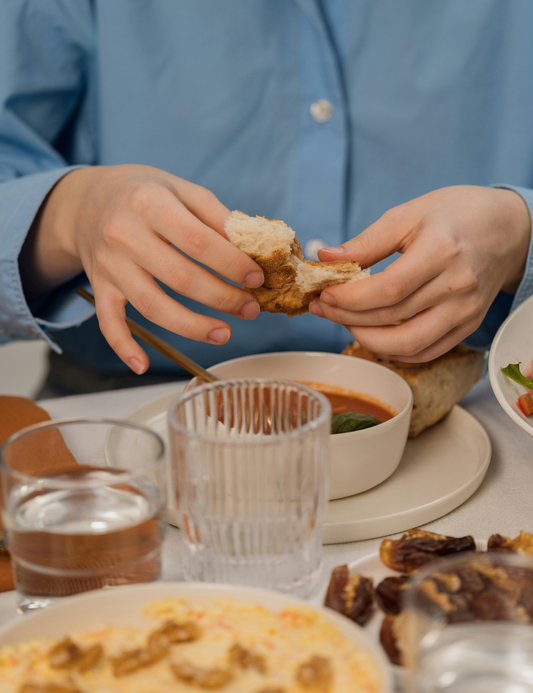Kids’ Nutrition: A Nutritionist’s Advice for Stress-Free Meals

Do you find yourself pleading with your child every night to take just a few bites? Does your little one refuse to even touch a piece of broccoli? We get it—feeding young children can sometimes feel like a real struggle for parents!
To help clear things up, the LOLO team reached out to Cosette Gergès, a pediatric nutritionist, to answer common questions. She shares practical, reassuring advice to take the stress out of mealtimes.
Is There a Trick to Making Kids Less Picky?
“Put on your most generous glasses and adjust your expectations! Parents often set the bar too high for their child’s stage of development, which makes us see them as picky eaters. But in reality, they’re just expressing themselves with the skills they have at the time.
A child’s eating habits are like a roller coaster: some days, they’re hungry; other days, not so much. One day they hate a food, the next they love it.
The best thing you can do is keep offering the same food in different ways—cooked, raw, baked with cheese, etc. And most importantly, don’t pressure them! Pressure is the biggest appetite killer and can shut down a child’s curiosity about food.
One last tip: Adjust your expectations. Some kids are naturally curious about new foods, while others are more hesitant. The key is to support them with kindness and patience.”
In a nutshell:
- Skip the pressure. The more you insist, the more they’ll resist.
- Offer variety. Try different forms of the same food—raw, grated, puréed, roasted.
- Let them serve themselves. Put a mix of familiar and new foods on the table and let them choose.
- Change the conversation. Talk about your day, have fun! When food isn’t the focus, kids explore at their own pace.
When Can You Introduce Shellfish and Peanuts into Your Baby’s Diet?
“As early as six months old, but not before four. In the past, experts recommended delaying allergenic foods. But research now shows that introducing them early—and keeping them in the diet—actually helps reduce the risk of allergies.
For example, it’s best to include eggs and peanuts in family meals one to three times per week.”
Are Canned Vegetables Nutritious?
“Absolutely! While some nutrients are lost during the canning process, the fiber content remains the same as in fresh or frozen produce. Plus, canned vegetables are budget-friendly, ready to use, and available year-round.
Tip: Mix it up! Choose fresh, frozen, or canned options based on your budget, availability, and preferences. Opt for no-salt-added versions to keep sodium levels in check.”
Is It Bad to Use Food as a Reward?
“Food shouldn’t be something children earn. However, it’s okay to celebrate moments together around the table. The focus should be on the occasion, not the food.
Telling a child they’ll get dessert only if they finish their plate can create anxiety and put sweets on a pedestal. Dessert should be treated like any other part of the meal.
Let’s also avoid labeling foods as ‘good’ or ‘bad.’ Everything has its place in a balanced diet.”
Should Kids Avoid Treats Like Chips and Cookies?
“Not at all! All foods have a place—including chips, cookies, and popcorn. The key is to avoid making them ‘forbidden,’ which only increases their appeal.
Associating these foods with enjoyable moments—like popcorn during a movie—helps normalize them without guilt or excess.
The goal: A healthy, relaxed relationship with food, free from obsession or strict rules. Eating should be enjoyable for both kids and parents!”
Should a Child Go on a Diet if They’re Overweight?
“Never! Unless a specific health condition requires dietary adjustments, dieting is not recommended for children—or adults.
Instead, focus on overall lifestyle habits: sleep, screen time, enjoyable family meals, structured eating schedules, and a balanced diet with less processed food.
We’re all born with an internal appetite regulator—it tells us when we’re hungry or full. It’s incredibly valuable!
A baby who’s nursing will naturally stop when they’re full. But once they start eating solid foods, parents sometimes stop trusting this instinct. We need to let kids listen to their own bodies.
A child’s appetite fluctuates throughout the day—just like the weather!
If they’re not eating much at dinner, maybe they’ve already met their needs earlier in the day, or maybe they’re just tired—and that’s okay.
Emotions also play a role. Sometimes, a child isn’t just hungry for food—they might be craving connection.
Parents need to adapt their expectations. While our expectations are fixed, children’s needs are constantly evolving.”
My Child is Very Active. Should I Adjust Their Diet?
“Yes, especially if they’re in an intensive program, like a sports academy. Their diet is just as important as their equipment!
Proper nutrition before, during, and after physical activity supports energy levels and recovery. If you’re unsure, a nutritionist can help tailor meals to their activity level.”
When Should You See a Nutritionist?
“As soon as you have a concern!
Many parents wait too long and end up using ineffective strategies. A quick consultation can prevent stress and reassure the whole family.
Healthy eating should never be a source of anxiety. If in doubt, seek advice!
Nutrition is an evolving science—we’re all learning, all the time!”
One Last Tip About Kids’ Nutrition?
“Be mindful of misinformation on social media!
There’s a lot of false advice about kids’ diets online. Before following any recommendations:
- Check the source. Is it backed by science? (e.g., Naître et Grandir)
- Prioritize experts. Look for books and articles written by nutritionists.
- Remember: Kids are not mini adults!
In short—get your info from trusted sources!”
Final takeaway: Pressure is the #1 enemy of healthy eating!
Our chat with this pediatric nutrition expert confirmed one key idea: creating a relaxed mealtime environment and trusting your child’s natural hunger cues is essential.
So let’s be patient, kind, and most of all—let’s enjoy these moments of family connection.
Bon appétit!
About Cosette Gergès
Cosette Gergès is a pediatric nutritionist and founder of the virtual clinic Nutritionnistes en pédiatrie. She helps parents and children with science-backed, family-friendly nutrition advice.
For more food inspiration, check out our Blog.
Looking for recipes? Visit our Recipes section.
Want to try our products? Here are a few ideas you might like:








